Nightmares Come At Night / Les Cauchemars Naissent La Nuit (1972)
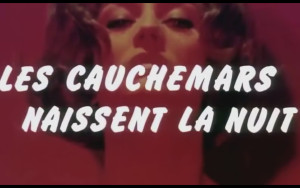
This came up on our Netflix recommendations after watching some trashy B-movie lost even to our forgiving history. Its title (it sounds less ridiculous in French, but who wants that?) and cover were irresistible; they promised pure trash. We didn’t expect something so disorientingly beautiful.
This was our entree into the work of Jesús “Jess” Franco, a man of many names and no taste. Estimates of his total output vary, but he himself placed it at over 200 movies, released under the names Jesús Franco, Jess Franco, Jess Frank, Clifford Brown, David Khune, James P. Johnson, and many more, including variants of all the above. Other than a few well-produced studio efforts, they were filmed on tiny and declining budgets, one movie often Frankensteined together from fragments filmed experimentally while working on others. It’s an intimidating, confusing-as-balls filmography, so a good entry point is worth something—and Nightmares was fascinating enough to get us hooked.
After opening credits with more unabashed nudity than a whole 21st-century American movie, plus disorienting zooms and camera effects (on stills, no less,) we encounter a cageful of birds. From there we cut to our sleeping heroine, Anna (Diana Lorys) and zoom into her nightmare. With that we’re straight into the sex and murder (sexmurder, the pros call it) and from then on we’re kept blissfully bewildered.
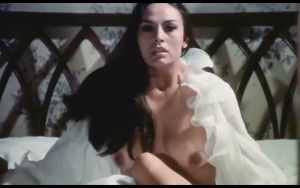
I woke up like this
When she wakes up, we meet her lover Cynthia (Colette Giacobine), and then Paul the doctor (Jess Franco regular Paul Muller.) The whole middle of the movie is Anna telling Paul the history of her and Cynthia, but because that history jumps in time and includes her own earlier conversations with Paul, it makes the structure of the story seem more convoluted than it is. The long flashback begins with Anna’s past stripping in a nightclub in Zagreb, and the weirdly sterile (but inventive) striptease sequence lasts almost 10 of the movie’s 85 minutes–you do the math and tell us this isn’t art. Diana Lorys seems to have been told to slowly writhe and (occasionally) strip on a table while Jess masturbates and plays with the zoom lens.
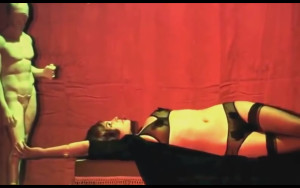
She invents whole new fetishes out of boredom
We see the story through dreams, flashbacks, recountings—we see the actual events through mirrors, cage bars, gauzy veils. We also hear the dialogue through an atrocious English dub that only enhances the movie’s off-putting strangeness. In one scene in the long middle flashback, Anna and Cynthia have their first conversation, but Anna’s narration cuts in over every line as soon as it starts, overwriting the dialogue (even though it was clearly written and recorded) with a synopsis of that dialogue. It undermines our trust in Anna and increases the mystery around Cynthia and her purposes, while reminding us of the artifice of the movie we’re watching—everything Jess likes in his most intellectually ambitious mode, which, unlike with many directors, is arguably his best.
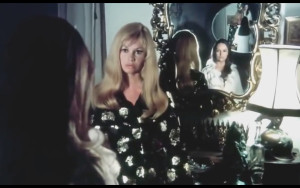
Fairly typical shot
The nudity and sex in this movie has a kind of innocence to it—I mean like Garden-of-Eden innocence. The camera may seem to embody the male gaze, but the characters have never heard of it, and wear exactly as much clothing as seems natural and comfortable in what must be a very warm house. The body-loving camera doesn’t understand about objectification either, but just laps at their skin like an excited puppy.
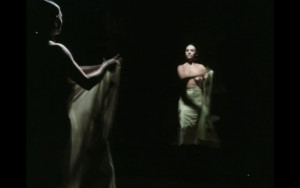
Anna puts this sheet on sari-style, and Jess films the entire process and puts it in the movie, out of apparently pure fascination.
Right from the first, we could tell that this was a director who made exactly the kind of movie he liked, who knew what he was into and would put it on the screen. He likes nude women and sometimes men, he likes birds, he likes mirrors, and he likes incessantly zooming in and out in a way that’s been tactfully described as “improvisational.” Many people don’t like his movies, for legitimate or illegitimate reasons. There are plenty of reasons not to make a Jess Franco movie, and Jess’s defining characteristic is that he doesn’t listen to any of them. He works without moderation, without prudishness, without conscience, without taste or caution, without feminist qualms; sometimes without coherent vision. Without, without, without.
The result is that Jess Franco movies, like B-/cult/trash cinema in general, are an insanely mixed bag of absolute garbage and wonders you’d never otherwise see. I’d give up a fair amount to unsee his worst movies, but I wouldn’t give up his best ones. Nightmares Come at Night is one of them, and it’s one of the best places to start.
